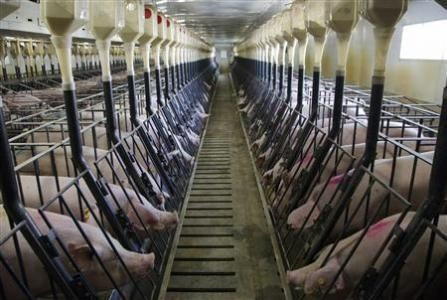State Laws In US Against Foreign Land Ownership Could Affect How China’s Shuanghui Manages Agricultural Land In Wake Of Smithfield Foods (SFD) Purchase

State laws in the U.S., many of them from the 1970s and rooted in fears of a Japanese takeover of American real estate, have emerged as a considerable hurdle to Shuanghui International's move to buy Virginia pork giant Smithfield Foods, Inc. (NYSE:SFD) for $4.7 billion.
What this means is that Shuanghui could find itself exposed to potential lawsuits in many of the states where Smithfield owns agricultural land, according to Reuters, which listed eight states that bar foreign agricultural-land ownership that also have land owned by Smithfield: Wisconsin, South Dakota, North Dakota, Minnesota, Missouri, Iowa, Nebraska and Oklahoma.
While Smithfield’s 11 abattoirs and pork-processing facilities in these states are safe from future legal challenges based on these state laws, thanks to World Trade Organization provisions on the General Agreement on Trade Services, the protection against state meddling against foreign direct investment might now apply to land used for ancillary purposes, such as manure lagoons and feed crops.
Shuanghui has been aware of the situation all along and appears to be moving ahead despite the legal exposure. The laws will likely have an effect on how the Chinese company structures its operations in the U.S. It could, for example, create a U.S. subsidiary with a local partner in majority control to manage the ancillary agricultural activities, thus rendering land ownership to a U.S. entity.
Some of these states have constituencies that are sensitive on the topics of foreign encroachments. For example, in 2011, Oklahoma passed a law banning local judges from considering international or Islamic law in state trials. It was an attempt by the state to pander to anti-Muslim sentiments and was blocked by a federal appeals court as a violation of religious freedom. But it was the part about international law that raised eyebrows, because the law effectively rendered international trade agreements as invalid in the state of Oklahoma.
Not all of the laws on the books in the states come from the Sinophobia that permeated American society in the '70s and early '80s as Japanese foreign direct investment and goods flooded into the U.S. In Wisconsin, the ban on foreign ownership of land allotments greater than 640 acres goes back to 1887 and was upheld by the state Supreme Court in 1976.
© Copyright IBTimes 2024. All rights reserved.






















